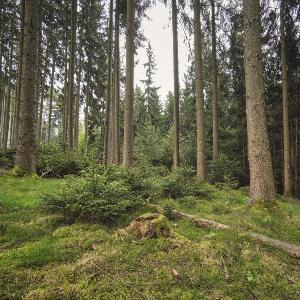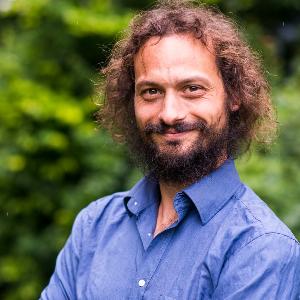Real-world laboratory in LMU forest: new collaboration for sustainability research
31 Jan 2024
In the LMU forest, an interdisciplinary consortium is researching how to make forests fit for the future.
31 Jan 2024
In the LMU forest, an interdisciplinary consortium is researching how to make forests fit for the future.

LMU's university forest is at the center of the large-scale project. | © LMU
Forests in Bavaria, Germany, and Europe are under huge pressure. Climate change is reducing their resilience and is increasingly threatening ecosystems and forestry yields. “The summers of drought in 2018 and 2019 have caused enormous damage and highlighted the need for action,” says Professor Lukas Lehnert, who leads the Physical Geography and Environmental Remote Sensing research group at LMU. At the same time, demand is increasing for wood products and other ecosystem services that forests provide.
Lehnert leads the new joint project LabForest – University forest as real-world laboratory for sustainable rejuvenation management in a changing climate, which will begin in February 2024 and has received 2.8 million euros in funding from the German Federal Ministry of Education and Research. The project will investigate future forest management options that can reconcile the various demands of climate action, economic interests, conservation, and hydrology. Through the establishment of a real-world laboratory, the research findings will feed into German forest and wood management practice.
The fact that LMU possesses its own forestry land is a golden opportunity for research.Lukas Lehnert
At the heart of the large-scale project is the LMU forest near the Bavarian town of Landshut, which will serve as a real-world laboratory for extensive experiments and measurements. “Our field experiment makes it possible for the first time to compare the effects of various forest and wood management methods in connection with disturbances and evaluate them in conjunction with their impacts on biodiversity and important ecosystem services,” explains Lehnert. The LMU forest makes for an ideal testing site, as its location is typical for the majority of Bavarian forest land urgently in need of transformation due to climate change. “The fact that LMU possesses its own forestry land is a golden opportunity for research.”
Researchers from the fields of geography, forest and wood management, and ecology make up the interdisciplinary consortium. As well as the LMU contributors, researchers from the Technical University of Munich (TUM), Dresden University of Technology, the Bavarian State Institute of Forestry (LWF), the Bavarian School of Forestry (Bayerische Waldbauernschule), and the Comital Forestry Office Arco-Zinneberg (Gräflich Arco-Zinneberg'sche Forstamt) are also involved. Over a period of five years, the scientists will closely monitor and analyze a wide variety of elements of the forest and their interactions under different management regimes: water cycle, biodiversity, carbon fixation, wood production, and pests such as bark beetles. To this end, they will collect measurement data on site, which they will then use to create complex models for hydrology, vegetation, economy, and life cycle assessment.
Forestry is faced with the question of how to sustainably manage an ecosystem with decades-long production cycles against the background of a rapidly changing environment.Wolfgang Obermeier

Lukas Lehnert is head of the new interdisciplinary joint project LabForest. | © Maik Dobbermann
Three research groups from LMU are conducting research in the university forest: Lukas Lehnert is employing drones to collect remote sensing data and is developing methods for the AI-based modeling of ecosystem variables. Professor Ralf Ludwig is comparing new AI models for an improved understanding of water cycles in forest areas, with a particular look at climate effects and extreme events, such as heavy precipitation, floods, heat, drought, and storms. Professor Julia Pongratz and Dr. Wolfgang Obermeier are optimizing a state-of-the-art vegetation model for calculating carbon storage and are developing a comprehensive matrix for evaluating these land-based methods for carbon dioxide removal from the atmosphere, drawing on the wide range of experimentally collected data.
Knowledge transfer partners and local stakeholders are also part of the consortium so that the research results can be directly incorporated into the training of new forestry specialists and forest management. “Forestry is faced with the question of how to sustainably manage an ecosystem with decades-long production cycles against the background of a rapidly changing environment,” says Wolfgang Obermeier from the Physical Geography and Land Use Systems research and teaching unit at LMU’s Faculty of Geosciences. Obermeier heads the Innovation Group within LabForest, which will bring together the results of the real-world experiment and transfer them to university teaching in the form of a scientific exchange platform called Future Forest Forum (Forum Zukunft Wald).
The members of the joint project are confident that their work can equip forests for upcoming challenges. “LabForest will make important contributions to the reaching of climate targets and the conservation and sustainable use of habitats and resources,” says Lukas Lehnert. Moreover, the project will come up with strategies for the sustainable management of south German forests and for dealing with crises and extreme events in the future.